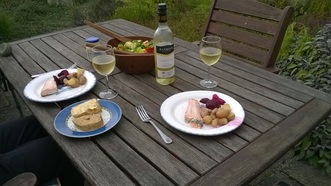 Blackberry and apple crumble
Blackberry and apple crumble Looking for inspiration for my 99-word food story, I turn to the novels on my physical and virtual bookshelves. Consistent with my miserablist inclinations, there’s a dominant theme of the problems that food or its lack can bring. In Shelley Harris’ novel, Jubilee, a boy’s divided loyalties to his white friends and Asian family is played out in his response to the food his mother plans to cook for a street party in 1970s Britain. (You can click on the link to find the quote.) One of the enduring images in Alison Moore’s debut, The Lighthouse, is the way in which, on a catered walking holiday along the Rhine, the main character consistently fails to get the food he has paid for. Although Lewis, the central character in her second novel, He Wants, is forced to endure fewer physical privations, his food is unsatisfying because it’s not what he actually wants.
 all home-grown except the fish, bread, wine and salad dressing
all home-grown except the fish, bread, wine and salad dressing I could see Comrade Buc writhing on the floor, a spilled can of peaches beside him. Q-Kee was fighting his convulsions to get the tube down his throat. Black saliva streamed from his mouth, his eyes were drooping, sure signs of botulism poisoning.
‘Forget it,’ I said. ‘The toxin’s already in his nervous system.’
She grunted in frustration. ‘I know, I screwed up,’ she said.
‘Go on.’
‘I shouldn’t have, I know,’ she said. ‘It’s just that, he knows everything.’
‘Knew.’
‘Yes, knew.’ She looked like she wanted to kick Buc’s shuddering body. ‘I thought if I could take a crack at him, then we’d figure this whole thing out. I came down here and asked him what he wanted, and he told me peaches. He said it was the last thing he wanted on earth.’
Food is also a focus of conflict in my own short fiction, albeit on a gentler scale. The Japanese Garden starts with a couple sharing an alfresco meal on the patio; all I can say is that I’m thankful that mine didn’t end up as Wilma and her husband’s did. And, although no eggs are broken in Peace-and-Quiet Pancake a child’s heart might be. Eggs are also the subject of this deceptively simple piece from Jill Storey, A Recipe for Certain Times of Life.

When my own imagination drew a blank, I thought I’d be like Shakespeare and, as I did for my sound flash, pilfer a ready-made story and try to whittle it down to those 99 words.
| I’ve chosen a classic morality tale about the Hindu god, Ganesh, which I got to know through our annual storytelling walk. (For those who have been part of the Twitter conversation on accents, there is evidence that mine is not RP on this post.) We’re trying to link this story of pride masquerading as hospitality to the environmental theme of using resources wisely and finding value in the basics. (There’s more about this, along with photos of this summer’s walk, on the Hindu Samaj blog.) | |
Kay clocked the cut-price stickers in her workmate’s trolley. “Bill’s roasting a salmon on Sunday. Why not join us? Bring the kids.”
Sharon demurred. “They eat like gannets.”
“Bill cooks for an army.”
Cooking to Impress on the marble counter, Bill plated the food. Three helpings later, Gareth asked for more. With a rictus smile, Kay popped a frozen lasagna in the microwave. Gareth wolfed it down in seconds.
“You can’t still be hungry,” hissed his mother.
“No problem,” said Bill. “I’ll cook whatever you fancy.”
“Scrambled eggs,” said Gareth. “Like Mum makes.”
“Shit! We’re clean out of eggs.”
Apologies for the convoluted route to get here. Seems I’m still hooked on nailing the ingredients of my fiction. Your feedback is always welcome.
In the coming week I’ll be reviewing two new novels that I’m really excited about: Station Eleven and A History of Loneliness. I’m hoping you’ll come back and find out why. If you haven’t done already, you can sign up for email updates via the sidebar.





















 RSS Feed
RSS Feed





















